Cleaning Services Westland
Find Cleaning Companies in Westland
Receive 3 FREE House Cleaning quotes for your project today! Compare profiles, reviews, accreditations, portfolio, etc... and choose the best service.
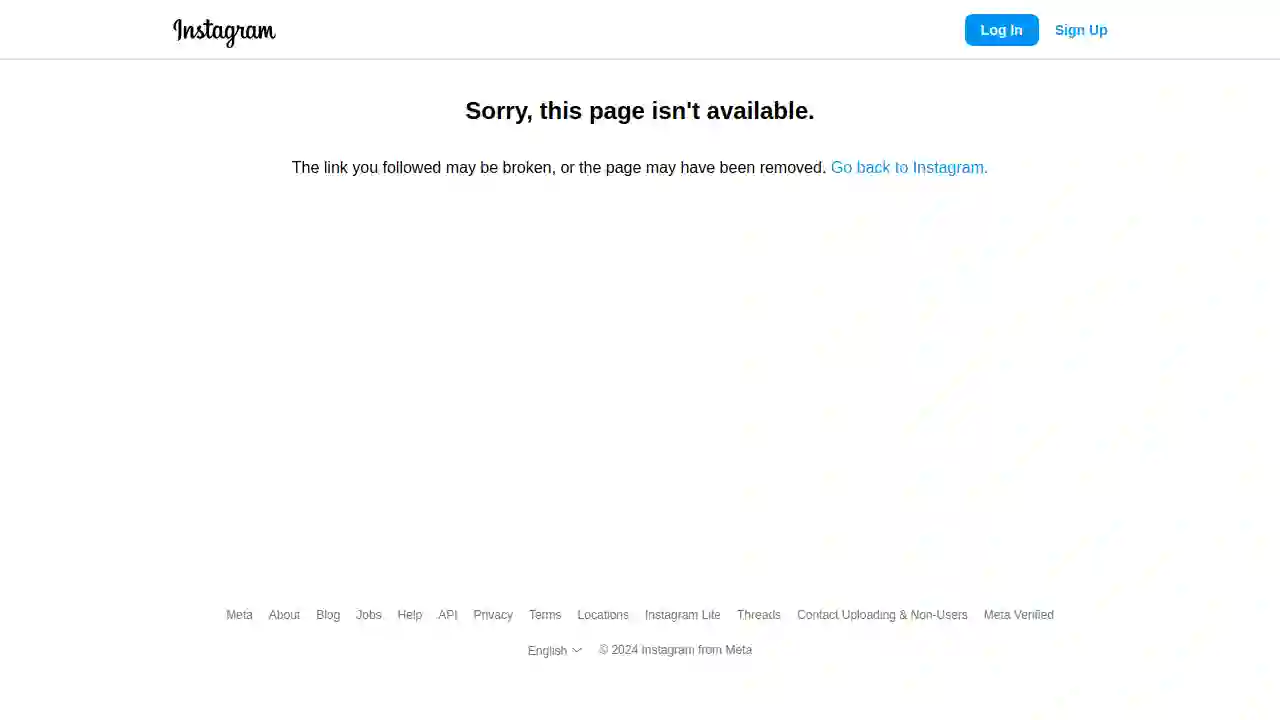
MMA cleaning services LLC
57 reviewsDetroit, USMMA Cleaning Services is a professional cleaning company dedicated to providing top-notch cleaning solutions to homes and businesses in the area. With a strong focus on customer satisfaction, our team of experts uses state-of-the-art equipment and eco-friendly products to ensure a sparkling clean environment that exceeds your expectations.
- Services
- Why Us?
- Gallery
Get Quote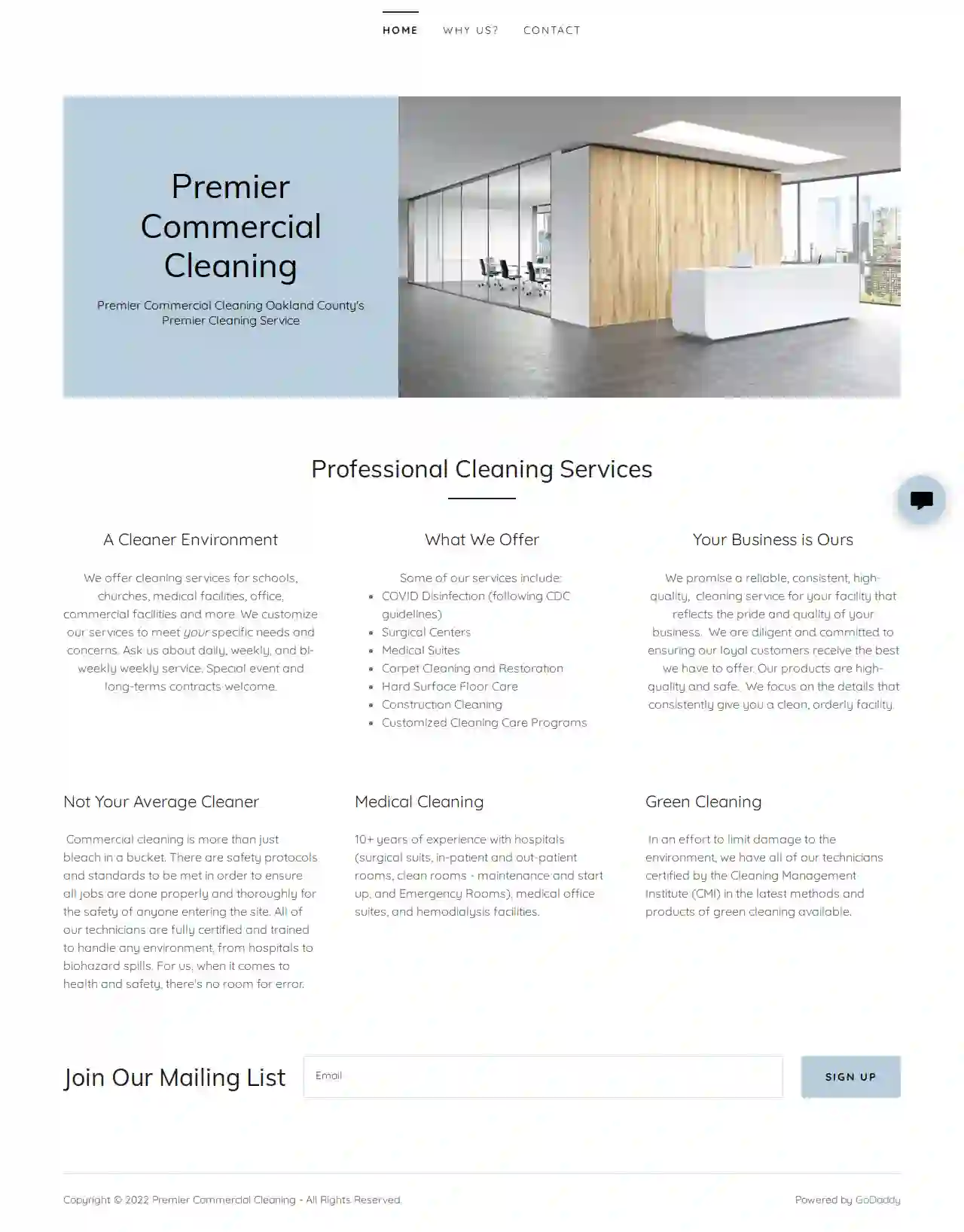
Premier Commercial Clean
Bloomfield Hills, MI, P.O. Box 7502, 48302-7502, USPremier Commercial Cleaning is a professional cleaning service provider that offers customized cleaning solutions for various facilities including schools, churches, medical facilities, offices, and more. With over 10 years of experience in medical cleaning, including hospitals, medical office suites, and hemodialysis facilities, they prioritize health and safety protocols. They also focus on green cleaning methods, ensuring all technicians are certified by the Cleaning Management Institute (CMI) in the latest green cleaning techniques. Their commitment to quality, reliability, and customer satisfaction sets them apart from average cleaners.
- Services
- Why Us?
- Accreditations
- Our Team
- Testimonials
- Gallery
Get Quote
Clean Team Battle Creek
543 reviewsDetroit, US- Services
- Why Us?
- Gallery
Get Quote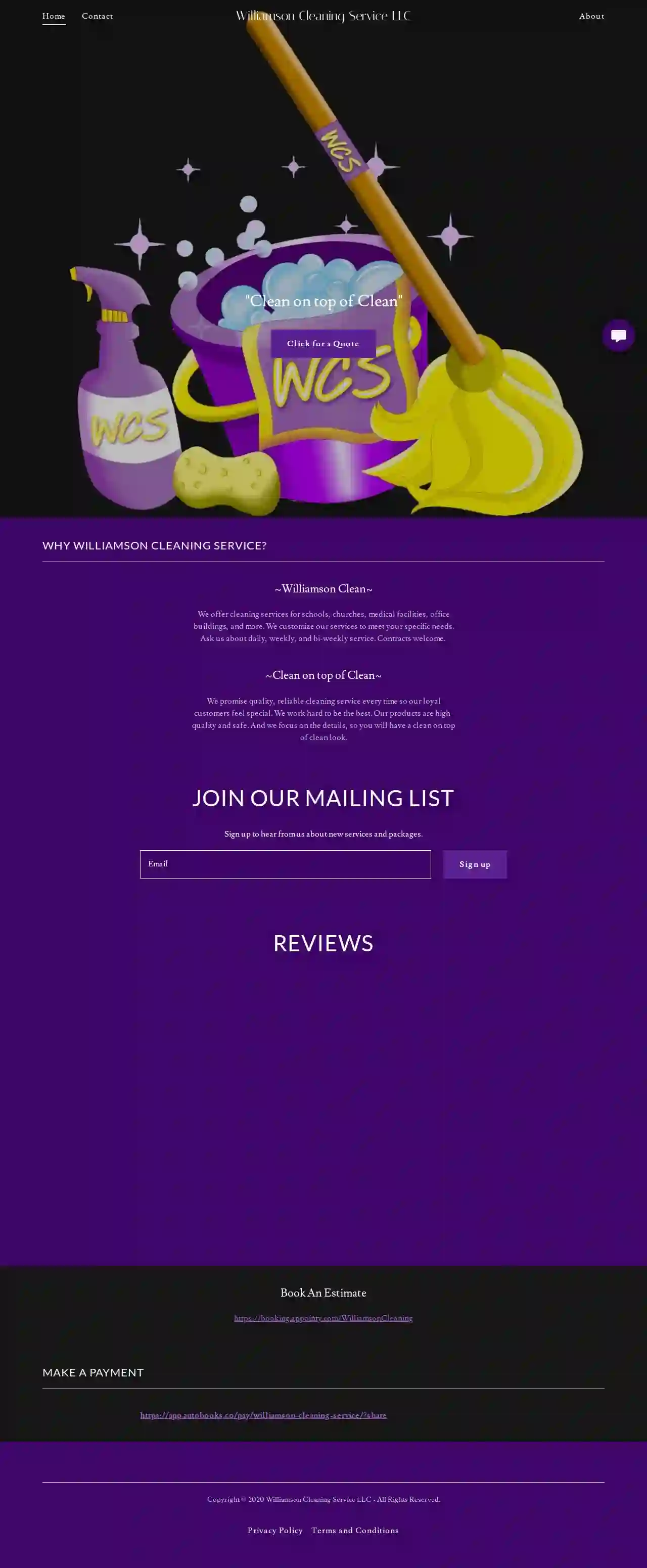
Williamson Cleaning Service LLC
4.819 reviewsKalamazoo, US- Services
- Why Us?
- Gallery
Get Quote
Gowens Good Cleaning Services LLC
4.990 reviewsKalamazoo, MI, United States, USGowens Good Cleaning Services, LLC is a locally owned and operated cleaning company with over 20 years of experience. We pride ourselves on customer relations and take every client request seriously, aiming to exceed every expectation. We offer a range of cleaning services, including COVID-19 disinfecting, carpet stain removal, interior windows, and more. Our team is bonded and insured, and we use professional-grade equipment and biodegradable products. We are committed to delivering the finest cleaning services available, and our goal is to help our clients enjoy their environment.
- Services
- Why Us?
- Our Team
- Testimonials
- Gallery
Get Quote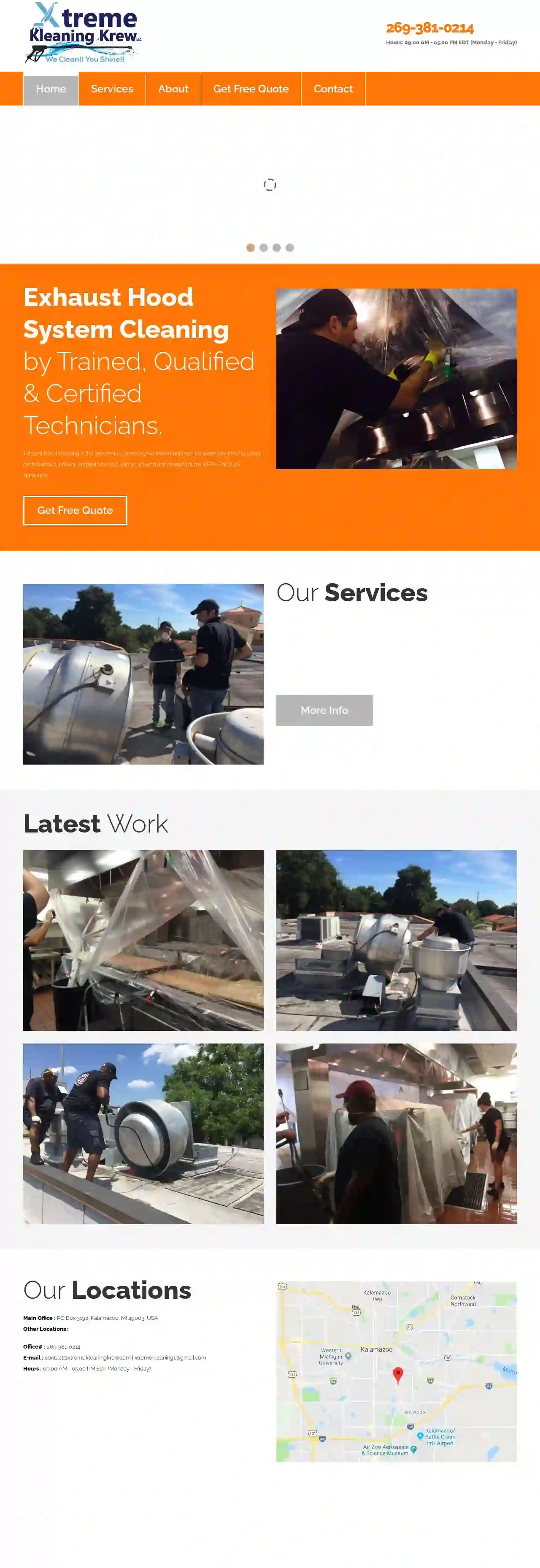
X-treme Kleaning Krew
4.48 reviewsPO Box 3192, Kalamazoo, 49003, USXtreme Kleaning Krew LLC is a leading provider of kitchen exhaust hood cleaning services. Our certified technicians are trained, qualified, and certified by the MFS Exhaust Hood Cleaning School to ensure that your entire exhaust system is cleaned in accordance with NFPA (National Fire Protection Association) code 96. Our mission is to be the best in our industry by giving you the very best exhaust hood cleaning service available. We strive to protect your investment like it was our own restaurant, and our office will schedule your cleanings on time so you are never late or non-compliant. Our services include exhaust hood system cleaning, hood filter weekly cleaning, power washing, and specialty cleaning. We utilize the best tools and equipment in the cleaning industry to provide detailed, thorough, and sanitary cleaning at a standard of excellence and quality to meet your needs and satisfaction.
- Services
- Why Us?
- Accreditations
- Gallery
Get Quote
Sort of Stephanie Commercial Janitorial Services
4.715 reviewsWixom, MI, 47620 West Rd., 48393, USSort of Stephanie is a woman-owned janitorial service company located in Wixom, Michigan, providing superior building and janitorial services to cities around southeastern Michigan. Our mission is to provide impeccable service to our communities by hiring, developing, and retaining passionate and dedicated individuals who, together, create a lifetime of remarkable experiences. We offer a wide range of services including reoccurring nightly services, day porters, and more. Our values, team, and passion for outstanding work set us apart. We promise to eliminate concerns about your service with our unique 'Helping Hand Method' which includes the Triangle Of Trust, Dream Team Selection, Precise Detailed Approach, Rapid Response, and Respect Policy. We are dedicated to making your workspace shine and providing you with a cleaning partner that makes your life easier.
- Services
- Why Us?
- Accreditations
- Our Team
- Testimonials
- Gallery
Get Quote
SERVPRO of Muskegon
4.896 reviews4075 Airline Rd, Muskegon, 49444, USSERVPRO of Muskegon is a trusted leader in the restoration industry, providing advanced cleaning and restoration services to residential and commercial properties. Our highly-trained team of certified professionals is ready to respond 24/7 to any size disaster. We specialize in water damage, fire damage, mold remediation, storm/disaster construction, and commercial services. Our goal is to make it "Like it never even happened."
- Services
- Why Us?
- Testimonials
- Gallery
Get Quote
Merry Maids of Muskegon
4.132 reviewsMuskegon, US- Services
- Why Us?
- Gallery
Get Quote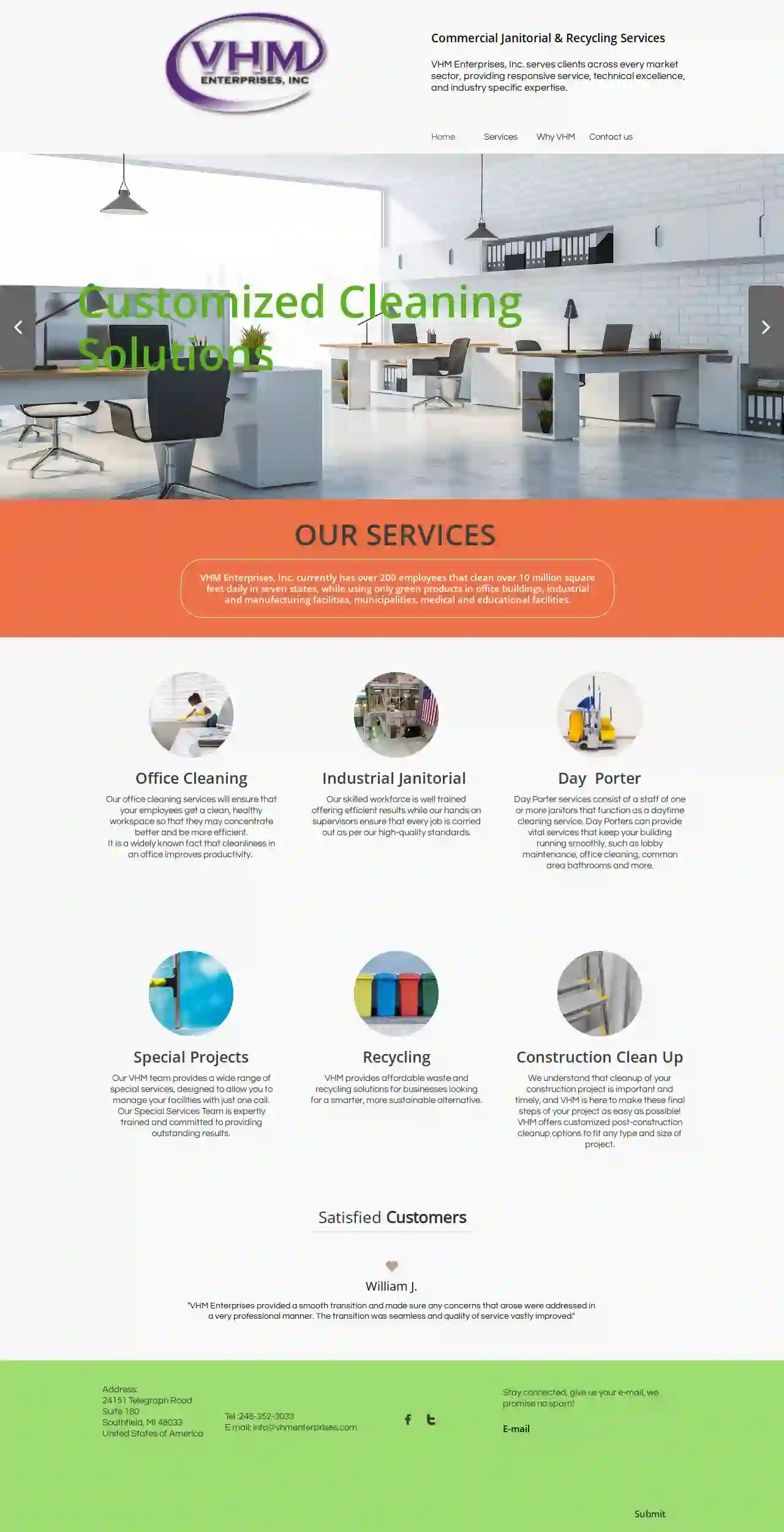
VHM Enterprises Inc
3.326 reviewsDetroit, US- Services
- Why Us?
Get Quote
Over 60,241+ Janitorial Services onboarded
Our janitorial pros operate in Westland & beyond!
CleaningMatch has curated and vetted Top Cleaning Companies in and around Westland. Find the most trustworthy business today.
Frequently Asked Questions About Cleaning Services
- Type of cleaning: Deep cleaning, regular cleaning, move-in/move-out cleaning, and specialized cleaning (e.g., carpet cleaning) have different price points.
- Size of the property: Larger properties typically require more time and resources, resulting in higher costs.
- Frequency of cleaning: Regular cleaning schedules often have discounted rates compared to one-time services.
- Location: Cleaning costs can differ based on regional labor costs and demand.
- Additional services: Extra tasks, such as window cleaning, laundry, or organization, will add to the overall price.
- Regular dusting: Dust frequently using microfiber cloths or a duster. Pay attention to surfaces that attract dust, such as shelves, electronics, and furniture.
- Vacuuming: Vacuum carpets and rugs regularly using a vacuum cleaner with a HEPA filter to trap dust mites and allergens.
- Air Purifier: Consider using an air purifier to remove dust particles and allergens from the air.
- Reduce Clutter: Clutter provides more surfaces for dust to settle. Declutter regularly to minimize dust traps.
- Window Treatments: Wash or vacuum window treatments, such as curtains or blinds, regularly to remove dust buildup.
- Bedding: Wash bedding, including sheets, pillowcases, and blankets, weekly in hot water to remove dust mites.
- Doormats: Place doormats at entrances to trap dirt and dust from shoes before they enter your home.
- Online Directories: Use online directories like CleaningMatch to search for cleaning services in your area. Filter your search results by the specific cleaning type you need.
- Search Engines: Use search engines like Google to find cleaning services specializing in your desired cleaning type. For example, search for 'post-construction cleaning services near me' or 'eco-friendly cleaning services in [city name].'
- Ask for Referrals: Ask friends, family, neighbors, or colleagues if they know of any reputable cleaning services specializing in your desired cleaning type.
- Check Company Websites: Visit the websites of cleaning services in your area to see if they list the specific cleaning type you need among their services.
- Contact Companies Directly: Contact cleaning companies directly to inquire about their specialization in your desired cleaning type.
Do I need to provide cleaning supplies for the cleaning service?
If you have specific preferences for cleaning products, such as eco-friendly or hypoallergenic options, communicate those to the cleaning service. They may accommodate your requests or allow you to provide your preferred supplies.
How much do cleaning services cost in the USA?
To get accurate pricing, request personalized quotes from reputable cleaning services on CleaningMatch. They will assess your specific needs and provide a tailored cost estimate.
How do I prevent dust from accumulating in my home?
By implementing these preventive measures, you can significantly reduce dust accumulation and maintain a cleaner and healthier home.
How do I find a cleaning service that specializes in [specific type of cleaning]?
By using these methods, you can find a qualified cleaning service that meets your specific cleaning needs.
Do I need to provide cleaning supplies for the cleaning service?
If you have specific preferences for cleaning products, such as eco-friendly or hypoallergenic options, communicate those to the cleaning service. They may accommodate your requests or allow you to provide your preferred supplies.
How much do cleaning services cost in the USA?
- Type of cleaning: Deep cleaning, regular cleaning, move-in/move-out cleaning, and specialized cleaning (e.g., carpet cleaning) have different price points.
- Size of the property: Larger properties typically require more time and resources, resulting in higher costs.
- Frequency of cleaning: Regular cleaning schedules often have discounted rates compared to one-time services.
- Location: Cleaning costs can differ based on regional labor costs and demand.
- Additional services: Extra tasks, such as window cleaning, laundry, or organization, will add to the overall price.
To get accurate pricing, request personalized quotes from reputable cleaning services on CleaningMatch. They will assess your specific needs and provide a tailored cost estimate.
How do I prevent dust from accumulating in my home?
- Regular dusting: Dust frequently using microfiber cloths or a duster. Pay attention to surfaces that attract dust, such as shelves, electronics, and furniture.
- Vacuuming: Vacuum carpets and rugs regularly using a vacuum cleaner with a HEPA filter to trap dust mites and allergens.
- Air Purifier: Consider using an air purifier to remove dust particles and allergens from the air.
- Reduce Clutter: Clutter provides more surfaces for dust to settle. Declutter regularly to minimize dust traps.
- Window Treatments: Wash or vacuum window treatments, such as curtains or blinds, regularly to remove dust buildup.
- Bedding: Wash bedding, including sheets, pillowcases, and blankets, weekly in hot water to remove dust mites.
- Doormats: Place doormats at entrances to trap dirt and dust from shoes before they enter your home.
By implementing these preventive measures, you can significantly reduce dust accumulation and maintain a cleaner and healthier home.
How do I find a cleaning service that specializes in [specific type of cleaning]?
- Online Directories: Use online directories like CleaningMatch to search for cleaning services in your area. Filter your search results by the specific cleaning type you need.
- Search Engines: Use search engines like Google to find cleaning services specializing in your desired cleaning type. For example, search for 'post-construction cleaning services near me' or 'eco-friendly cleaning services in [city name].'
- Ask for Referrals: Ask friends, family, neighbors, or colleagues if they know of any reputable cleaning services specializing in your desired cleaning type.
- Check Company Websites: Visit the websites of cleaning services in your area to see if they list the specific cleaning type you need among their services.
- Contact Companies Directly: Contact cleaning companies directly to inquire about their specialization in your desired cleaning type.
By using these methods, you can find a qualified cleaning service that meets your specific cleaning needs.